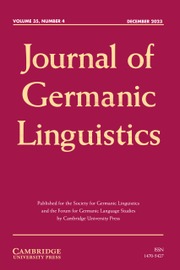Article contents
On Perception and Sonority in Cluster Simplification: Consonant Deletion in Icelandic Preterites
Published online by Cambridge University Press: 01 September 2004
Abstract
This article investigates the motivations for consonant cluster simplification through an analysis of consonant deletion in Icelandic, in clusters of three consonants created by the addition of the preterite suffix -ti/-di/-ði directly to the verb stem. It is argued that deletion is driven by perceptual factors interacting with sonority requirements. Deletion targets stops and nonstrident obstruents and its likelihood correlates with similarity in manner and place of articulation between the consonants and their adjacent segments. These two generalizations are elucidated in terms of perceptual cues, and an optimality-theoretic analysis is developed in which more perceptible consonants are protected from deletion by higher-ranked faithfulness constraints.I am grateful to Ólafur Páll Jónsson and Haraldur Bernharðsson, as well as Hanna Óladóttir, for patiently going through a long list of verbs with me and answering my questions. Haraldur also provided me with useful references and easy access to them. Thanks also to Michael Kenstowicz, Eiríkur Rögnvaldsson, and two anonymous JGL reviewers for answering questions, discussing different issues, and commenting on earlier versions of this research.
Information
- Type
- ARTICLES
- Information
- Copyright
- © 2004 Society for Germanic Linguistics
References
- 1
- Cited by

